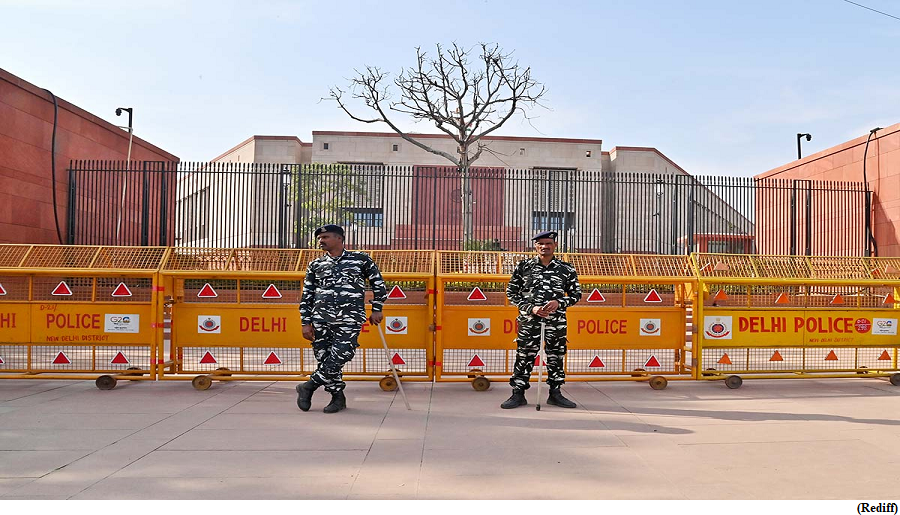UNESCO recognises Kempegowda T2 as one of world most beautiful airports (GS Paper 1, Culture)

Why in news?
- Kempegowda International Airport Bengaluru has earned prestigious accolades at UNESCO's 2023 Prix Versailles.
- The Terminal 2 (T2) secured recognition as one of the 'World's most beautiful airports' and was awarded the coveted 'World special prize for an interior 2023.'
Key features of Terminal 2 (T2):
- Terminal 2 of the Bengaluru International Airport earlier received the prestigious IGBC platinum certification by the Indian Green Building Council under the IGBC Green New Building Rating system
- In phase 1, T2 is designed to accommodate 25 million passengers per annum (MPPA), aligning with its vision of blending functionality with aesthetic appeal.
- T2 aims to be a visual delight to all passengers with its insightfully curated art and decor elements that are part of its recently launched art programme that promises to be awe-inspiring making passengers' journey through the terminal an unforgettable experience.
- The sustainable design of T2, the world's largest terminal pre-certified with a platinum lead rating by the US Green Building Council before operational commencement, reflects the airport's commitment to environmental responsibility.
About Prix Versailles awards:
- The Prix Versailles awards were established in 2015.
- It is announced each year at UNESCO.
- The award is given for outstanding achievements in architecture and design on a global scale.
- The award focuses on intelligent sustainability as a cultural driver, acknowledging innovation, creativity, reflection of local heritage, ecological efficiency and values of social interaction.
CISF replaces Delhi police for Parliament complex security
(GS Paper 2, Governance)
Why in news?
- The Ministry of Home Affairs (MHA) has asked the Central Industrial Security Force (CISF) to take security charge of the Parliament building from the Delhi Police.
- The CISF will first conduct a survey of the premises prior to the deployment of its security and fire wing.
- This comes after the December 13 Parliament security breach, in which two individuals jumped into the Lok Sabha chamber from the visitors’ gallery, and opened canisters emitting yellow smoke.

Details:
- The CISF will replace Delhi Police as the agency in charge and will take over all related responsibilities, including frisking entrants.
- Security within the complex will continue to be the responsibility of the Lok Sabha Secretariat. The Delhi Police will continue to protect the outer perimeter.
- The change will be enforced after a detailed security survey ordered by the Home Ministry.
About CISF:
Established in 1969 after a fire in Ranchi’s HEC
- In June 1964, a devastating fire had broken out in Ranchi’s Heavy Engineering Corporation plant, with reports suggesting sabotage.
- This led to the appointment of the Justice Mukherjee Commission which recommended the establishment of a dedicated industrial protection force.
- Thus, the CISF was set up by an Act of Parliament on March 10, 1969.
One of seven Central Armed Police Forces
- It is one of seven Central Armed Police Forces (CAPF) under the MHA — the other six being the Border Security Force, the Indo-Tibetan Border Police, the Sashastra Seema Bal, the Assam Rifles, the National Security Guard, and the Central Reserve Police Force.
Provides security to India’s industrial undertakings
- It was first inducted at the Fertilizer Corporation of India manufacturing plant in Trombay, Maharashtra, on November 1, 1969.
- Initially, its remit was restricted to protecting government-owned industries, but this was expanded to include joint-ventures and private undertakings in 2009.
- It also provides consultancy services to the private sector.
Women Force:
- CISF has the largest percentage of women in its force, in comparison to all other CAPFs.
- The first batch of women constables was inducted in 1987, and the first woman officer joined as Asstt. Comdt in 1989.
- CISF is currently headed by Special DG Nina Singh, the first woman to occupy the post.
High-efficacy malaria vaccine manufactured by Serum Institute passes WHO quality checks
(GS Paper 2, Health)
Why in news?
- A malaria vaccine manufactured by the Serum Institute of India has passed the next round of regulatory approval by the World Health Organization (WHO).
- The R21/Matrix-M malaria vaccine developed by the University of Oxford and the Indian company meets the WHO standards for vaccine quality, safety and efficacy.

Details:
- R21/Matrix-M malaria was added to the WHO's list of prequalified vaccines.
- The vaccine was recommended for use for the prevention of malaria in children by the global health agency on October 2, 2023.
WHO List of Prequalified Vaccines:
- If a vaccine has undergone thorough evaluation of relevant data, testing of samples and WHO inspection of relevant manufacturing sites it is included in the WHO List of Prequalified Vaccines.
- The WHO also tests the vaccine’s suitability for the target population, usability with appropriate concomitant products and compliance with operational specifications for packaging and presentation.
- The prequalification means larger access to vaccines as a key tool to prevent malaria in children, with it being a prerequisite for vaccine procurement by United Nations Child Rights body UNICEF and funding support for deployment by Gavi, the Vaccine Alliance.
Significance of R21/Matrix-M malaria:
- The vaccine is highly effective and can reduce malaria cases by 75 per cent over a year. Prior to this, the best vaccine had a 50 per cent success rate over a year and a lower success rate over three years.
- Further, Serum Institute can produce hundreds of millions of doses of this vaccine each year.
- The vaccine will also be cheaper, priced at around $5 per dose at high volumes.
Way Forward:
- The R21 vaccine is the second malaria shot approved by WHO, following the RTS,S/AS01 one, which was approved in July 2022.
- In clinical trials, both vaccines have been shown to be safe and effective in preventing malaria in children.
- The vaccines are expected to have a large public health impact when widely implemented alongside other recommended malaria control interventions.




